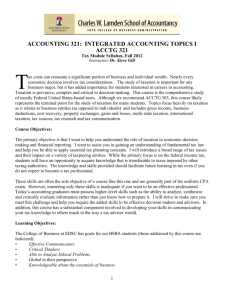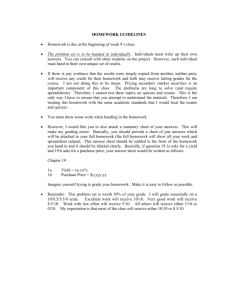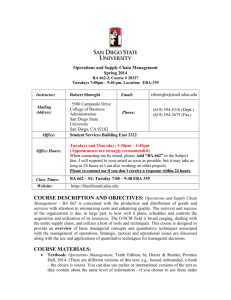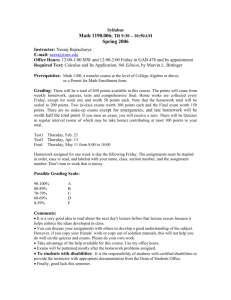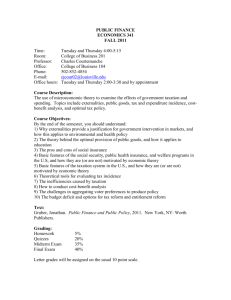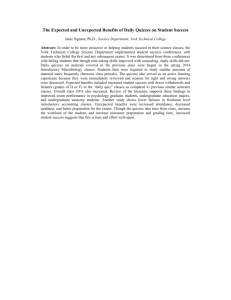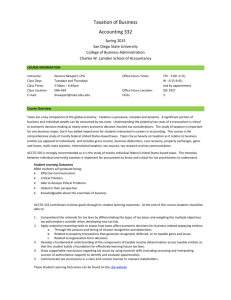ACCOUNTING 322-- INTEGRATED ACCOUNTING TOPICS II (Tax
advertisement
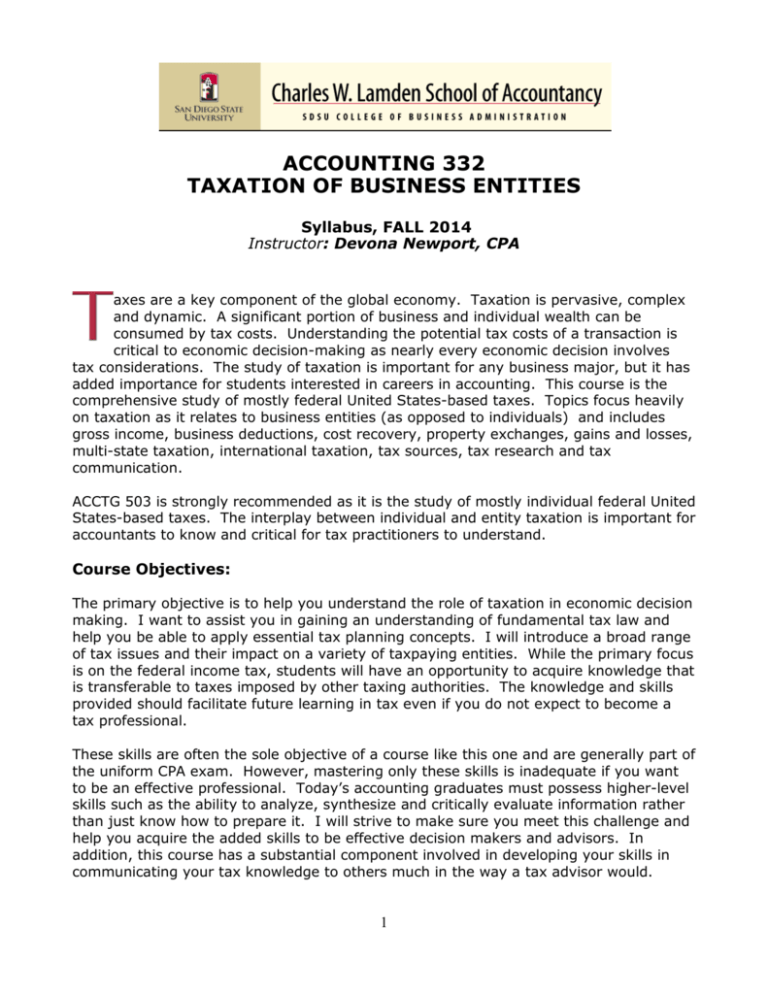
ACCOUNTING 332 TAXATION OF BUSINESS ENTITIES Syllabus, FALL 2014 Instructor: Devona Newport, CPA axes are a key component of the global economy. Taxation is pervasive, complex and dynamic. A significant portion of business and individual wealth can be consumed by tax costs. Understanding the potential tax costs of a transaction is critical to economic decision-making as nearly every economic decision involves tax considerations. The study of taxation is important for any business major, but it has added importance for students interested in careers in accounting. This course is the comprehensive study of mostly federal United States-based taxes. Topics focus heavily on taxation as it relates to business entities (as opposed to individuals) and includes gross income, business deductions, cost recovery, property exchanges, gains and losses, multi-state taxation, international taxation, tax sources, tax research and tax communication. ACCTG 503 is strongly recommended as it is the study of mostly individual federal United States-based taxes. The interplay between individual and entity taxation is important for accountants to know and critical for tax practitioners to understand. Course Objectives: The primary objective is to help you understand the role of taxation in economic decision making. I want to assist you in gaining an understanding of fundamental tax law and help you be able to apply essential tax planning concepts. I will introduce a broad range of tax issues and their impact on a variety of taxpaying entities. While the primary focus is on the federal income tax, students will have an opportunity to acquire knowledge that is transferable to taxes imposed by other taxing authorities. The knowledge and skills provided should facilitate future learning in tax even if you do not expect to become a tax professional. These skills are often the sole objective of a course like this one and are generally part of the uniform CPA exam. However, mastering only these skills is inadequate if you want to be an effective professional. Today’s accounting graduates must possess higher-level skills such as the ability to analyze, synthesize and critically evaluate information rather than just know how to prepare it. I will strive to make sure you meet this challenge and help you acquire the added skills to be effective decision makers and advisors. In addition, this course has a substantial component involved in developing your skills in communicating your tax knowledge to others much in the way a tax advisor would. 1 Learning Objectives: The College of Business at SDSU has goals for out BSBA students (those addressed by this course are italicized): • Effective Communicators • Critical Thinkers • Able to Analyze Ethical Problems • Global in their perspective • Knowledgeable about the essentials of business The Charles W. Lamden School of Accountancy (SOA) has learning objectives for each undergraduate accounting major. A complete list of these can be found on the SOA’s website. This course intends to address the following of those learning objectives: 1. Determine the income tax of taxable entities in order to assess the effects of personal, investment and business transactions on their tax and after-tax cash flows. 2. Prepare professional written reports for accounting related topics 3. Apply ethical rules, theories and regulatory guidelines to the practice of public, private and tax accounting; understand the need for professional integrity and objectivity. Learning Outcomes: At the end of this course students should be able to: 1. Comprehend the rationale for tax laws by differentiating the types of tax bases and weighing the multiple objectives tax policymakers consider when developing new tax law. 2. Apply analytical reasoning tools to assess how taxes affect economic decisions for business-related taxpaying entities: a. Through the amount and timing of income recognition and deductions b. Related to property transactions that generate recognized, deferred, or no taxable gains and losses c. Related to organization form decisions. 3. Develop a fundamental understanding of the components of taxable income determination across taxable entities so that the student builds a foundation for effectively learning future tax laws 4. Draw supportable conclusions regarding tax issues by using research skills (including accessing and interpreting sources of authoritative support) to identify and evaluate opportunities 5. Communicate tax conclusions in a clear and concise manner to relevant stakeholders. Course Material: Essentials of Taxation, Individuals and Business Entities 2015 Ed., (Smith, Raabe, Maloney, Young) CengageNOW.com. Information on how to sign up for CengageNOW.com will be posted to Blackboard. Prerequisites: Upper Division Business Major, Business Minor, or other approved Non-Business Major Academic Honesty: Accounting is a profession that depends on trust – individuals, companies and society as a whole place reliance on the decisions and opinions of accountants. For most of history, accountants were viewed among the most trusted members of society. In recent years, certain events have eroded this trust. Rebuilding this trust will take a long time but can be accomplished if future accountants ensure that such lapses do not recur. I take my role in this effort very seriously (and I expect you will as well). The SDSU Standards for Student Conduct (http://www.sa.sdsu.edu/srr/conduct1.html) states that unacceptable student behavior includes “cheating, plagiarism, or other forms of academic dishonesty that are intended to gain unfair academic advantage.” Unprofessional conduct adversely impacts your fellow students, the accounting faculty, the Charles W. Lamden School of Accountancy, SDSU, and the accounting profession. The Charles W. Lamden School of Accountancy takes academic honesty very seriously and vigorously enforces university policy related to any such infractions. Any student suspected of academic dishonesty will be reported to the SDSU Center for Student Rights and Responsibilities; if found responsible, the student could receive an “F” on the assignment or an “F” in ACCTG 332. Plagiarism According to the SDSU Academic Senate policy on cheating and plagiarism: 2.2 Plagiarism shall be defined as the act of incorporating ideas, words, or specific substance of another, whether purchased, borrowed, or otherwise obtained, and submitting same to the University as one’s own work to fulfill academic requirements without giving credit to the appropriate source. Plagiarism shall include but not be limited to (a) submitting work, either in part or in whole, completed by another; (b) omitting footnotes for ideas, statements, facts, or conclusions that belong to another; (c) omitting quotation marks when quoting directly from another, whether it be a paragraph, sentence, or part thereof; (d) close and lengthy paraphrasing of the writings of another; (e) submitting another person’s artistic works, such as musical compositions, photographs, paintings, drawings, or sculptures; and (f) submitting as one’s own work papers purchased from research companies. Because the course requires preparation of written works, the temptation to plagiarize is stronger than in most accounting (or business) courses. When you put your (or your group members) name at the top of the assignment, the prevailing notion is that all the ideas, words, or specific substance are those of your own creation and not another unless it is made obvious to the reader that is not the case. As stated above, I reserve the right to assign a grade of F in ACCTG 332 if you plagiarize. To reduce the temptation, we will use Turnitin in Blackboard for written submissions. 3 Assessment: Your primary assessment will be through exams, case studies, quizzes, and homework. Exams, homework, cases, etc. will be given on the dates listed in the course calendar. Quizzes are not listed in the course calendar. Assessment Midterm Exam I Midterm Exam II Comprehensive Final Exam Quizzes Cases/Projects Homework Total for course % of grade 20% 20% 30% 10% 10% 10% 100% Midterm and Final Exams: All exams will be cumulative for material presented up to that date. You MUST take your exam during the scheduled exam time for your section. There are no provisions for missed exams other than those required under University policy. My exams are long and difficult and may often test not only your ability to master the material but also to efficiently communicate your knowledge back to me. Time management is an important element to success on my exams. Quizzes: The quizzes are intended to be a test of how thoroughly you have understood previously discussed material. They are intended to assist you in preparing for the exams. Quizzes cannot be made up; no exceptions. It is my intention to have 5 quizzes and drop the lowest quiz score. If you miss a quiz, that quiz will be the one I drop. Cases/Projects: The cases may focus on: (1) successfully researching a tax issue using SDSU’s online tax research system (RIA Checkpoint); (2) completing tax return or related information in good form; (3) some combination of the above or (4) some other topic. The cases will be prepared during time outside of class. Typically, your case solutions will be collected in class or using Turnitin in Blackboard. Homework: Homework assignments are largely prepared using the CengageNOW online homework manager associated with your textbook. In some instances, homework may also be due in written or typed format. Due dates will be listed on the course calendar. Late homework will not be accepted. I will drop your lowest homework grade. Results: Exams and quizzes are not handed back during class time for review by students. If you wish to go over your results, you must make an appointment to review the item in my office. There is no makeup or extra credit work if you did not pass or get the grade you wanted. Please don't ask for special treatment because if I give it to one student, I have to offer it to all students in the class. Attendance: I do not take attendance. If you are unable to attend class, do not expect that I will make up that lecture for you individually in office hours. Office Hours: I will post office hours on Blackboard. However, I prefer that you make an appointment to see me. This reserves a time for you and gives you priority over students who “drop in” without an appointment. However, especially around exams, I will limit the length of any scheduled appointment in order to accommodate all students. I am happy to help you but I expect you to come prepared to meetings during office hours. Try and write out your questions beforehand. You may also e-mail me your questions. If I am able to answer your question by e-mail I will do so. More complex questions are best addressed in person. Professional Behavior: Students are expected to behave in a professional manner at all times. A key component of professionalism is respect for the thoughts, feelings, and needs of others. I will not tolerate disrespectful behavior towards a fellow student. I will respect your time and ask that you respect mine. Please do not e-mail me questions that are adequately addressed in class, in Blackboard, or on the SDSU website. I reserve the right to ignore e-mails that ask such things as “Are we having a quiz today?”, “When is the final?”, or “Please explain Chapter 4 to me.” Students with Disabilities: If you are a student with a disability and believe you will need accommodations for this class, it is your responsibility to contact Student Disability Services at (619) 594-6473. To avoid any delay in the receipt of your accommodations, you should contact Student Disability Services as soon as possible. Please note that accommodations are not retroactive, and that accommodations based upon disability cannot be provided until you have presented your instructor with an accommodation letter from Student Disability Services. Your cooperation is appreciated. 5
